Social sharing and bookmarking have taken a back seat to Facebook and Twitter. For most of us, using sites like Digg, Delicious, StumbleUpon, or Reddit rarely crosses our minds.
Yet, these and other such services can provide a number of benefits to your ecommerce site, and here’s why. In today’s web economy, content needs to be both “findable” via search engines and “shareable” via social media. In this article, we will look at the benefits, from both perspectives, to using social bookmarking and sharing .
SEO Benefits
Social bookmarking sites provide a way to organize, collate and categorize the web using a classification structure called “tags.”
Tags are little more than labels that are applied to a given, bookmarked resource. Tagging is a bottom-up, user-generated form of categorization that allows people to use whatever vocabulary is helpful to them. While this may seem a bit chaotic and messy, it has become a common method to annotate and classify content on the web.
While tags are useful as a means of classification, they also provide value in search engine optimization, as those tags are also keywords, indexable by the engines.
According to Search Engine Journal, a highly regarded SEO resource, social bookmarking services like Delicious and StumbleUpon can help search engines in a variety of ways:
- Faster indexing of sites. Humans bookmark sites launched by their friends or colleagues before a search engine can find them.
- Deeper indexing of sites. Many bookmarked pages reside deep within the framework of a site and is sometimes not as easily linked by others, or as easily crawlable by search engine spiders.
- Increased quality. If more users bookmark a page, the more authority, quality and relevance the site is perceived to have.
- External meta data. Users who bookmark sites tag them with keywords and descriptions, which add honest, and unbiased definitions.
- Number of votes. Similar to the number of bookmarks, the more votes a page receives on Digg or Reddit, the more useful that information usually is. If the same page receives multiple votes across social news voting sites, search engines will perceive it as having higher quality.
- Categorization. Using tags, categorization can help define the subject of a site, therefore helping the engine address searcher intent and provide more relevant returns.
Social Media Benefits
Not only does social bookmarking and sharing provide SEO benefit, it is also a fast method for social networkers to spread news about your products to their online friends. I like to think of social bookmarking and sharing as serendipity that encourages the viral spread of your site’s content.
For example, let’s say a consumer has landed on the product description page and wishes to share information about the product with his or her friends. One option to do this is the “Email to a Friend” function. But now, social sharing is another option that reaches the consumer’s friends, and more.
A consumer who lands on a product page that does not offer social sharing likely won’t go copy and paste the URL of the page on his or her Facebook Wall or otherwise bother to recommend it to friends. Providing an easy means of social sharing encourages the activity. If it’s easy to do, consumers will likely do it.
Share This
“Share This” is an application that facilitates sharing to many social bookmarking sites. Note that we use it here (see above) at Practical eCommmerce, and we reviewed it in “The PEC Review: Share This Makes Adding Social Media a Breeze.” It was created as a plug-in for WordPress, but has been redeveloped for use by virtually any site.
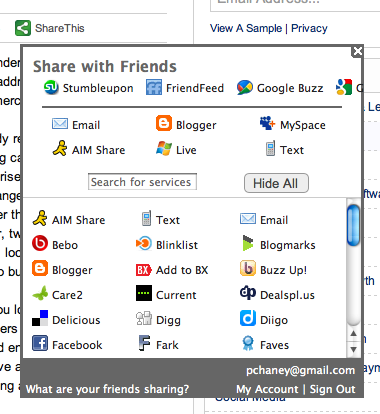
‘Share This’ pop-up.
Share This not only includes links to all the sites mentioned above, but many others as well, including Facebook, Twitter, Google Buzz, StumbleUpon and over 50 others.
Share This also enables posting of content to blogs and includes a forward to a friend feature. You simply place the Share This button on any web page that you wish to make sharable. Another similar service is Add This.
Example of a shopping cart using the Add This button:
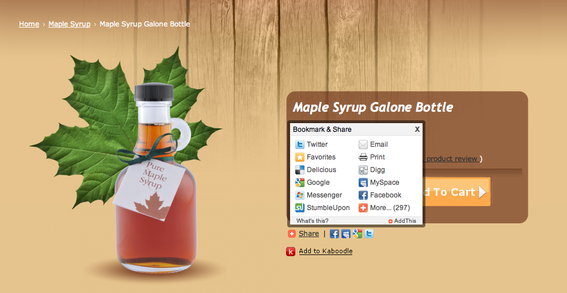
‘Add This’ pop-up on shopping page for Maple Syrup Galone Bottle.
Facebook Like Button
A newer form of sharing that has become increasingly popular is the Facebook “Like” button.
The Like button lets users share content with their friends on Facebook. When the user clicks the button on your site, a story appears in the user’s friends’ News Feed with a link back to your website. The user remains on your site throughout the process.
The Like button has become the new way of indexing the web that’s completely based on users’ choices. Given the enormous popularity of Facebook across the globe–500 million users worldwide and 150 million in the U.S. alone–having the Like button on your ecommerce site can be very helpful.
A number of ecommerce cart providers easily enable the use of the Like button on their platforms. This includes Magneto, BigCommerce, 3dcart and Zen Cart, to name a few.
Facebook Recommendations Button
Another option provided by Facebook is the Recommendations plugin, which shows personalized recommendations to your users.
Since Facebook hosts the content, the plugin can display personalized recommendations whether or not the user has logged into your site. For a logged-in Facebook user, the plugin will give preference to and highlight objects her friends have interacted with.
Facebook provides resources to help understand and implement Like and Recommendations buttons, along with an overview of each of its social plugins, at its developer center.
Examples from Online Stores
Here are examples of stores using social bookmarking and sharing:
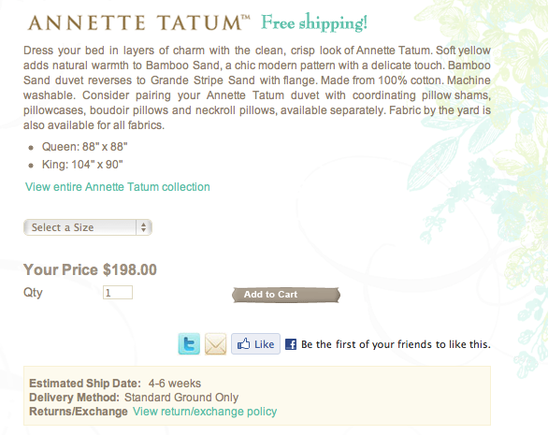
Sharing with Twitter, Email and “Like” on Layla Grace.
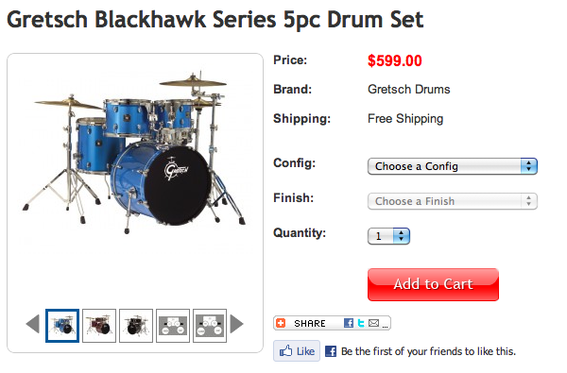
Social bookmarking and sharing on California Percussion.
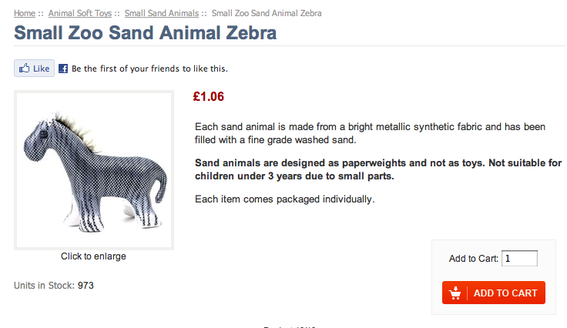
Note the “Like” button on Present Time Gifts.
Conclusion
Instead of visitors bookmarking your site via their browsers’ bookmark functions, incorporate social sharing. In most cases it is easy to implement and costs nothing to use. It will benefit your business from both a search engine optimization and social media standpoint, resulting in better search returns, more traffic to your ecommerce site and increased sales.




